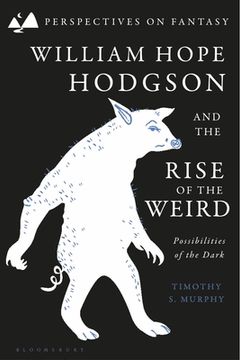Compartir
William Hope Hodgson and the Rise of the Weird: Possibilities of the Dark (en Inglés)
Timothy S. Murphy
(Autor)
·
Bloomsbury Academic
· Tapa Dura
William Hope Hodgson and the Rise of the Weird: Possibilities of the Dark (en Inglés) - Murphy, Timothy S. ; Sangster, Matthew ; Fimi, Dimitra
$ 487.694
$ 975.389
Ahorras: $ 487.694
Elige la lista en la que quieres agregar tu producto o crea una nueva lista
✓ Producto agregado correctamente a la lista de deseos.
Ir a Mis Listas
Origen: Estados Unidos
(Costos de importación incluídos en el precio)
Se enviará desde nuestra bodega entre el
Martes 25 de Junio y el
Jueves 04 de Julio.
Lo recibirás en cualquier lugar de Colombia entre 1 y 5 días hábiles luego del envío.
Reseña del libro "William Hope Hodgson and the Rise of the Weird: Possibilities of the Dark (en Inglés)"
The first comprehensive study of the works of William Hope Hodgson, one of the true innovators of Weird fiction, this book examines the Weird novels and stories upon which his posthumous reputation rests, his non-fantastic writing, identifiable literary influences, and the historical contexts in which he wrote. Focusing extensively upon major works such as The House on the Borderland (1908) and The Night Land (1912), Timothy S. Murphy surveys topics including Hodgson's experiments with code switching and linguistic experimentation; his depictions of racial and ethnic differences and gender and sexuality; the function of space and place in his writing; the adaptation of his shipboard experiences; and his use of abyssal time. With special attention paid to his paradoxical nihilist humanism, this book explores what made Hodgson a respected precursor to later innovators such as H. P. Lovecraft and C.L. Moore, and what makes him an important ancestor to 21st-century writers such as China Miéville, Greg Bear, and Charlie Jane Anders. Demonstrating how his work is both of his time and 'untimely', Murphy recovers Hodgson as the most significant figure to precede the fantastically popular but deeply controversial Lovecraft, as well as a figure whose work challenges what has thus far been accepted about the genre and the interpretive perspectives from which we view it.
- 0% (0)
- 0% (0)
- 0% (0)
- 0% (0)
- 0% (0)
Todos los libros de nuestro catálogo son Originales.
El libro está escrito en Inglés.
La encuadernación de esta edición es Tapa Dura.
✓ Producto agregado correctamente al carro, Ir a Pagar.

